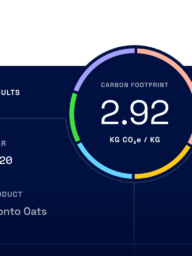Calculate carbon footprints for
food products
Biocode is your one-stop solution to calculate a product’s carbon footprint, delivering results in kg CO2e/kg. It provides a detailed view of emissions and explains them in various life cycle stages, all through an interactive tool.
Emission inventory
Pinpoint your climate action
Emission factor database
Ready-to-use emission factors at your fingertips
Product carbon footprint
Clearly presented in kg CO2e/kg
Overview of emissions
From cradle-to-gate

Biocode has dramatically increased our understanding of our products and their emissions. For example, our own knowledge of the carbon footprint of our oatmeal is now crystal clear.
Emission inventory
Raw materials
Production, cultivating, fishing or hunting
Sourcing
Transportation to production facilities
Production
Energy consumption for primary product & allocation some emissions to the co-products
Packaging
Production and transportation of the packaging materials
Emission factors
Built-in database
Built-in database for ready-to-use emission factors. Calculate the climate change impact of your activities over 100 years (GWP100).
Clear information
Each emission factor presented in the Biocode, has an information on how the emission factor is formed.
Tailored emission factors
Emissions can also be tailored for your specific processes or calculated with your producers.
Overview on the carbon footprint
Results shown in clear graphs
Showing the partial footprint and percentages by life cycle stage.
Easy to understand product carbon footprint
Presented in kg CO2e/kg
Dig in to the details
See the details either by category or emissions.
Frequently asked about product LCA’s in Biocode
Life Cycle Assessment (LCA) is a method for assessing the environmental impact of a product. With Biocode, you can easily evaluate the carbon footprint of a food product by applying LCA principles.
The different life cycles in Biocode LCA tool are:
- raw materials
- sourcing
- production
- packaging.
This approach is referred to as “cradle-to-gate,” and it specifically evaluates stages up to the point where the product leaves the factory, providing insights into production-related impacts. The usage and disposal phases can be assessed separately.
Product Environmental Footprint (PEF) guideline specifies that “The cut-off criterion to be applied in PEF studies is that modelled flows must account for at least 90% of the overall contributions to each of the environmental impact categories considered.” Therefore, it’s possible to exclude certain elements (up to 10%) from the product’s LCA. However, it’s essential for the LCA to encompass the most relevant aspects of the product.
Calculating energy usage in such cases can be challenging, but it’s important to remember that life cycle assessment is called an “assessment” for a reason. Sometimes, you may need to make your best estimate and make adjustments later if necessary. One way to roughly estimate product-specific energy consumption is by considering factors such as the mass ratio of the products or the time spent in production.
Biocode’s calculation method is built upon two key standards from the ISO 14000 series. ISO 14067 serves as the international standard for calculating product-specific carbon footprints, while ISO 14040 is the international standard for conducting life cycle assessments. These standards offer general guidance on calculating carbon footprints and conducting life cycle assessments.
Furthermore, the life cycle assessment generated using the Biocode calculator aligns with the PEF and IPCC guidelines, as well as the standards from international GHG protocol, which dictate how companies should calculate and report their emissions.
For more detailed explanations, please visit the principle page.
Visually clear reporting
Biocode reports are visual and digital, making them easy to share and update in real time globally
Climate measures
Communicate your company’s climate measures, goals and achievements
Product profile
Demonstrate that you are actively calculating your products’ carbon footprints
Carbon footprint progress
Follow product-specific carbon footprint development


Guide: Carbon Footprint Calculation
Calculating the carbon footprint is an important step towards more climate-friendly practices. But where to start calculating the carbon footprint? This guide will help you get started!
Try for free.
No strings attached.
Become part of the solution in the combat against climate change. By signing up you can immediately examine and test the carbon footprint calculations of your products.
14-day free trial, no credit card required
EXPERIENCE CARBON FOOTPRINTING AND EMISSION CALCULATION
Full access to try the company emission & product carbon footprint calculator
Training, support and reporting services require a paid plan. Personal use for farmers and producers is free.
